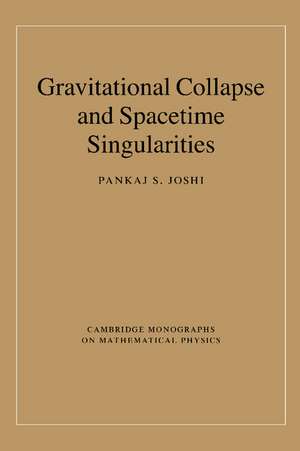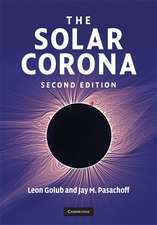Gravitational Collapse and Spacetime Singularities: Cambridge Monographs on Mathematical Physics
Autor Pankaj S. Joshien Limba Engleză Paperback – 19 sep 2012
| Toate formatele și edițiile | Preț | Express |
|---|---|---|
| Paperback (1) | 450.93 lei 6-8 săpt. | |
| Cambridge University Press – 19 sep 2012 | 450.93 lei 6-8 săpt. | |
| Hardback (1) | 890.89 lei 6-8 săpt. | |
| Cambridge University Press – 12 dec 2007 | 890.89 lei 6-8 săpt. |
Din seria Cambridge Monographs on Mathematical Physics
- 8%
 Preț: 429.05 lei
Preț: 429.05 lei - 8%
 Preț: 488.24 lei
Preț: 488.24 lei -
 Preț: 398.63 lei
Preț: 398.63 lei -
 Preț: 327.44 lei
Preț: 327.44 lei -
 Preț: 309.48 lei
Preț: 309.48 lei -
 Preț: 232.44 lei
Preț: 232.44 lei - 14%
 Preț: 981.98 lei
Preț: 981.98 lei -
 Preț: 291.62 lei
Preț: 291.62 lei -
 Preț: 215.60 lei
Preț: 215.60 lei -
 Preț: 259.39 lei
Preț: 259.39 lei -
 Preț: 389.41 lei
Preț: 389.41 lei - 9%
 Preț: 867.24 lei
Preț: 867.24 lei - 14%
 Preț: 882.44 lei
Preț: 882.44 lei -
 Preț: 215.55 lei
Preț: 215.55 lei - 9%
 Preț: 679.20 lei
Preț: 679.20 lei -
 Preț: 351.96 lei
Preț: 351.96 lei - 11%
 Preț: 422.27 lei
Preț: 422.27 lei -
 Preț: 372.97 lei
Preț: 372.97 lei -
 Preț: 368.17 lei
Preț: 368.17 lei - 11%
 Preț: 506.16 lei
Preț: 506.16 lei - 19%
 Preț: 437.96 lei
Preț: 437.96 lei - 11%
 Preț: 619.56 lei
Preț: 619.56 lei -
 Preț: 374.88 lei
Preț: 374.88 lei -
 Preț: 365.09 lei
Preț: 365.09 lei -
 Preț: 385.63 lei
Preț: 385.63 lei - 11%
 Preț: 464.44 lei
Preț: 464.44 lei - 11%
 Preț: 419.02 lei
Preț: 419.02 lei - 14%
 Preț: 1175.91 lei
Preț: 1175.91 lei - 11%
 Preț: 518.55 lei
Preț: 518.55 lei - 11%
 Preț: 448.37 lei
Preț: 448.37 lei -
 Preț: 444.29 lei
Preț: 444.29 lei - 11%
 Preț: 682.44 lei
Preț: 682.44 lei -
 Preț: 421.40 lei
Preț: 421.40 lei -
 Preț: 321.05 lei
Preț: 321.05 lei - 11%
 Preț: 479.51 lei
Preț: 479.51 lei - 11%
 Preț: 478.18 lei
Preț: 478.18 lei - 23%
 Preț: 1396.38 lei
Preț: 1396.38 lei - 14%
 Preț: 897.75 lei
Preț: 897.75 lei - 11%
 Preț: 577.80 lei
Preț: 577.80 lei - 11%
 Preț: 479.52 lei
Preț: 479.52 lei - 11%
 Preț: 572.25 lei
Preț: 572.25 lei - 14%
 Preț: 885.90 lei
Preț: 885.90 lei -
 Preț: 460.39 lei
Preț: 460.39 lei
Preț: 450.93 lei
Nou
Puncte Express: 676
Preț estimativ în valută:
86.28€ • 90.33$ • 71.40£
86.28€ • 90.33$ • 71.40£
Carte tipărită la comandă
Livrare economică 05-19 aprilie
Preluare comenzi: 021 569.72.76
Specificații
ISBN-13: 9781107405363
ISBN-10: 110740536X
Pagini: 284
Dimensiuni: 170 x 244 x 15 mm
Greutate: 0.45 kg
Editura: Cambridge University Press
Colecția Cambridge University Press
Seria Cambridge Monographs on Mathematical Physics
Locul publicării:New York, United States
ISBN-10: 110740536X
Pagini: 284
Dimensiuni: 170 x 244 x 15 mm
Greutate: 0.45 kg
Editura: Cambridge University Press
Colecția Cambridge University Press
Seria Cambridge Monographs on Mathematical Physics
Locul publicării:New York, United States
Cuprins
1. Introduction; 2. The spacetime manifold; 3. Spherical collapse; 4. Cosmic censorship; 5. Final fate of a massive star; References; Index.
Recenzii
'… beautifully produced …' The Observatory
'… provides a useful introduction to aspects of gravitational collapse and the development of singularities. It would provide a useful starting point to either a graduate student already familiar with general relativity, or an already active researcher in a different area of relativity, who wishes to investigate recent work on gravitational collapse.' Mathematical Reviews
'This monograph … should be useful to students and mature researchers alike. It focuses especially on the issue of 'cosmic censorship': what conditions, in mathematical models of collapse, can lead to naked singularities, what are the singularities' properties, and how might the laws of loop quantum gravity modify singularity formation … rich insights flow from this book's analyses, and its summaries of the relevant literature are particularly useful. Anyone interested in gravitational collapse will find this book's insights and literature summaries of great value.' Kip S. Thorne, Feynman Professor of Theoretical Physics, Emeritus, California Institute of Technology
'Gravitational collapse of massive objects is still a major unsolved problem in general relativity at the present time. Collapse of massive objects may lead to a black hole, but may also lead to a naked singularity. Both are possible, as the conjectured 'cosmic censorship' that would cloak naked singularities does not always hold; it is an important topic in gravitational physics to determine which will occur under what circumstances. In this well reasoned book, Dr Joshi gives a careful survey of the general relativity aspects of this problem, emphasizing how it remains unsolved to the present day. The book will provide a good springboard for those wishing to tackle this important problem.' George Ellis, University of Cape Town
'… provides a useful introduction to aspects of gravitational collapse and the development of singularities. It would provide a useful starting point to either a graduate student already familiar with general relativity, or an already active researcher in a different area of relativity, who wishes to investigate recent work on gravitational collapse.' Mathematical Reviews
'This monograph … should be useful to students and mature researchers alike. It focuses especially on the issue of 'cosmic censorship': what conditions, in mathematical models of collapse, can lead to naked singularities, what are the singularities' properties, and how might the laws of loop quantum gravity modify singularity formation … rich insights flow from this book's analyses, and its summaries of the relevant literature are particularly useful. Anyone interested in gravitational collapse will find this book's insights and literature summaries of great value.' Kip S. Thorne, Feynman Professor of Theoretical Physics, Emeritus, California Institute of Technology
'Gravitational collapse of massive objects is still a major unsolved problem in general relativity at the present time. Collapse of massive objects may lead to a black hole, but may also lead to a naked singularity. Both are possible, as the conjectured 'cosmic censorship' that would cloak naked singularities does not always hold; it is an important topic in gravitational physics to determine which will occur under what circumstances. In this well reasoned book, Dr Joshi gives a careful survey of the general relativity aspects of this problem, emphasizing how it remains unsolved to the present day. The book will provide a good springboard for those wishing to tackle this important problem.' George Ellis, University of Cape Town
Descriere
This book examines gravitational collapse for graduate students and researchers in gravitation physics, fundamental physics, astrophysics, and cosmology.










